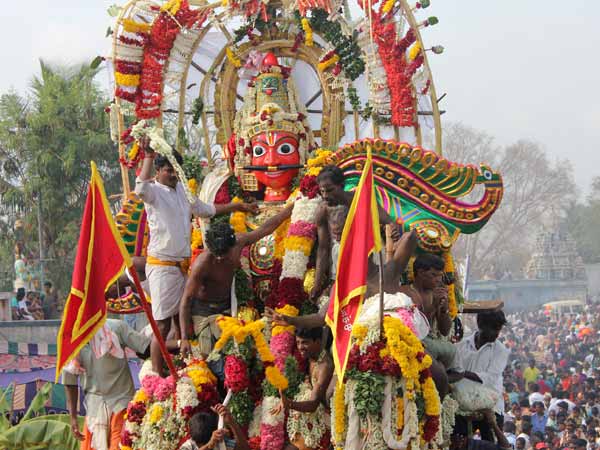By Aishwarya Nabh
During the battle of Kurukshetra the Pandavas brother were advised by their warrior-in-chief
that a warrior from their side has to be sacrificed to goddess Kali in order to gain a winning
edge over the Kauravas – and the chosen warrior was none other than Arjun’s son who was
born out of wedlock– Aravan.
Though Aravan had no qualms in going ahead and getting himself sacrificed for the victory
of the Pandavas in the battlefield and he did so for the love for his family and uncles, but he
had one last wish before voluntarily succumbing to death – he wanted to get married,
therefore, he was offered three blessings by Lord Krishna; first- that his death will be written
down in history books as an heroic act, second- he would be able to witness the war even after
his death and third being – he would get married before he dies. But then the dilemma was – which king would have his daughter get married to be widowed the next morning – it is then,
that Lord Krishna assumed the form of Mohini- a beautiful young woman and married
Aravan.
In Koovagam, a small village 200 miles south of Madras, on Chitrai Purnima – the new year
of the Tamil lunar Calendar – the village becomes a festive ground for individuals from the
third gender community coming over from all around the country for a ceremony of
marriage and subsequent widowhood. The individuals from the aforesaid community get
dressed up in their best bridal attire and marry the deity. It is an 18 day festival taking place
at Koothandavar temple, every April, this ancient myth comes to life in Koovagam, where
Lord Aravan is worshipped. The third gender group in Tamil Nadu, who are devotees of
Lord Aravan are called Aravanis.
There are make-shifts stalls within the temple premises, where coconuts, flowers and bangles
are bought and same the is offered to Lord Aravan – there are also beauty pageants organised
where they wear their best sarees, elaborate hairstyles, gaudy make-up and gold jewellery – and parade down the runway, showing off their talent to the thunderous applaud from the
audience. The beauty pageants have received considerable attention and recognition over the
years.
Considered mostly a joyous festival, Aravanis here also talk about the sexual abuse and assault
that they undergo everyday of their life along with being ostracised by the society at large. But
at least in Koovagam – they are welcomed to be who they are.
Aravanis enact the story from the Tamil rendition of Mahabharata, where they get married
to Lord Aravan, one of the priests from the temple starts the wedding by tying a yellow
coloured string called the thali (mangalsutra) around the neck of each Aravani, to make her
one with her Lord. Thrilled after getting married, Aravanis make merry by dancing and
singing dressed in their bridal attire till late night.
The next morning which is the last day of the festival, is when Lord Aravan is sacrificed and
this is when Aravanis gather around in a huddle at a designated mourning ground called
azhukalam- and start to cry because their beloved Lord Aravan is no more. As one of the
rituals is to indicate the start of widowhood, a priest from temple breaks the Aravani’s
bangles, cuts the thali and throws it in the pyre outside the temple.
The Aravanis now change into widow whites to accept their widowhood and walks away from the temple and mourn for a month. The widowhood is only symbolic and temporary. A massive effigy of Lord Aravan is taken through the streets of Koovagam and then the body is set to flames – and they return next year for the same marriage ritual.
Koovagam is a rare occasion when the whole community is united, comes together under the
same roof and openly flaunt their sexuality and gender without being mocked at or shunned.
This is also a political statement as much as it is a cultural one – a collective protest against
the society for being ill treated and discriminated till date.
PC 1 : holidify.com


